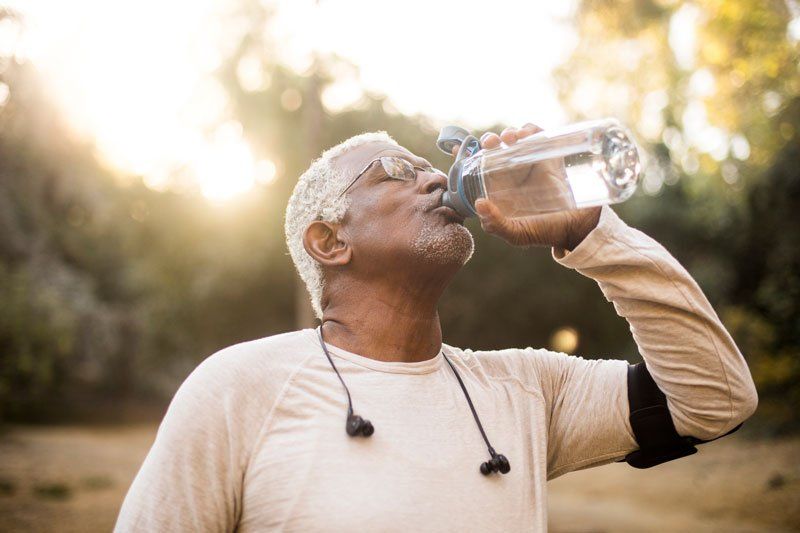8 Signs You Are Dehydrated
8 Signs You Are Dehydrated. Maintaining proper hydration is essential to overall good health. Without water, your cells can’t function, which is why humans can only survive a few days without fluids (1Trusted Source).
Unfortunately, many adults and kids don’t consume enough fluids, which can lead to chronic dehydration (2Trusted Source).
What’s more, conditions like diarrhea, vomiting, and excessive sweating can lead to acute or short-term dehydration (2Trusted Source, 3Trusted Source).
Dehydration can negatively affect many aspects of health and even be life threatening in severe cases, so it’s important to know the potential signs and symptoms of dehydration in both adults and kids.
This article covers 8 signs and symptoms of dehydration in adults, as well as explains the most common signs of dehydration in infants and kids.

8 signs you’re dehydrated
Here are 8 potential signs and symptoms of dehydration to watch out for.
Keep in mind that these symptoms could also indicate an underlying health condition unrelated to dehydration. If you’re experiencing one or more of these symptoms, it’s important to visit a healthcare professional for appropriate care.
1. Fatigue
8 Signs You Are Dehydrated. If you’re dehydrated, you may feel more tired than usual (2Trusted Source).
This is because dehydration affects every aspect of health, including your sleep-wake cycles.
One study that included more than 26,000 Chinese and American adults found that shorter sleep duration was significantly associated with inadequate hydration, as well as that people who were adequately hydrated slept longer than those who were not (4Trusted Source).
Being dehydrated can likewise make you feel more fatigued during exercise.
One small study that included 14 male athletes found that acute dehydration of 3.2% body mass led to increased fatigue perception and also negatively affected exercise endurance (5Trusted Source).
2. Dark-colored urine and low urine output
8 Signs You Are Dehydrated. If you’re not drinking enough fluids, your urine will be a darker color and you won’t pee very much.
In fact, looking at the color of your urine is considered a practical way to identify dehydration (6Trusted Source).
Darker-colored urine can occur when your body is conserving more water and not releasing it into urine. For this reason, the urine becomes more concentrated with waste products from the body, like sodium and urea (7Trusted Source).
The goal is not to have completely clear urine. Instead, the ideal urine color is a pale yellow, like the color of light straw.
Keep in mind that other factors can affect your urine color, including the use of medications and B vitamins, which can turn urine bright yellow.
3. Dry skin, decreased skin elasticity, and cracked lips
8 Signs You Are Dehydrated. One of the most common signs of dehydration is dry skin and lips and decreased skin elasticity (8Trusted Source).
If you’re experiencing dry skin, dry mouth, and dry or cracking lips, dehydration may be contributing to these symptoms.
Keep in mind that dry skin and cracked lips can also be a sign of many other health conditions, so it’s important to get the right diagnosis, especially if you’re experiencing dry skin or cracked lips even when you’re drinking optimal amounts of water.
Healthcare professionals often use something called the skin turgor test to assess a person’s hydration status.
The skin turgor test involves grasping the skin on the lower arm or abdomen between two fingers and then releasing it after a few seconds.
Hydrated skin will rapidly return to its normal position, while dehydrated skin will remain in a “tented” position and take much longer to bounce back (9Trusted Source).
Decreased skin turgor is usually a sign of moderate to severe dehydration (9Trusted Source).
4. Headaches
When you’re not getting enough fluids, you may get frequent headaches.
Even though dehydration is strongly linked to headaches, researchers aren’t exactly sure how dehydration causes headaches.
One theory is that fluid depletion in the body leads to the stretching of blood channels in the brain, leading to headaches (10Trusted Source, 11Trusted Source).
However, researchers acknowledge that there are likely multiple mechanisms behind dehydration-related headaches, and that some people may be more susceptible to dehydration-related headaches than others (11Trusted Source).
Some studies show that increasing water intake may help reduce headache symptoms in people who experience migraine.
One study that included 256 women with migraine headaches showed that migraine severity, frequency, and duration were significantly lower in those who drank more water (12Trusted Source).
5. Light-headedness and dizziness
Dehydration may cause you to feel dizzy and light-headed, especially when you stand up (13Trusted Source).
Orthostatic hypotension is the medical term for a reduction in blood pressure when you stand or sit up (14Trusted Source).
Dehydration can lead to orthostatic hypotension. This is especially common among older adults, who are more at risk of developing dehydration and low blood volume (hypovolemia) (15Trusted Source).
Being dehydrated may cause you to feel dizzy and light-headed, especially when you stand or sit up quickly.
Severe dehydration may even lead to fainting in some cases, especially among older adults (16Trusted Source).
6. Heart palpitations
Being dehydrated may cause cardiac symptoms like palpitations, or a sensation of pounding, fluttering, or an irregular heartbeat (2Trusted Source).
Not drinking enough fluids can negatively affect overall health, including heart health.
According to one review, dehydration may impair heart function in several ways, including by negatively affecting blood vessel function and altering blood pressure regulation (17Trusted Source).
Dehydration can also compromise heart function in people who are performing intense exercise in the heat.
It does this by decreasing the amount of blood pumped out of the left ventricle of the heart and reducing cardiac output — the amount of blood the heart pumps per minute (18Trusted Source).
7. Low blood pressure
Low blood pressure is a sign of dehydration that only appears if a person is significantly dehydrated.
As mentioned above, dehydration impairs blood vessel function and blood pressure regulation. Dehydration causes low blood volume — that is, a low amount of fluid circulating within your capillaries, veins, arteries, and chambers of your heart (19Trusted Source).
When your blood volume decreases, your body compensates by increasing your pulse and respiratory rate, as well as by decreasing your blood pressure (19Trusted Source).
Low blood pressure is a sign of severe dehydration, and it can be dangerous. Severe dehydration could lead to significantly low blood pressure, shock, and even death (20Trusted Source).
8. Poor concentration and altered mental state
Not taking in enough fluids can take a toll on your brain and reduce your ability to concentrate.
Some studies have shown that dehydration can be detrimental to short-term memory, concentration, and mood.
A small study including 12 men found that abstaining from drinking water for 36 hours led to higher error rates on tests and negatively affected energy, mood, attention, and memory. Rehydration with water alleviated these symptoms (21Trusted Source).
Many other studies have also shown that dehydration can negatively affect mood and cognitive performance in both men and women (22Trusted Source, 23Trusted Source).
Severe dehydration can lead to an altered mental state, which can seem like confusion and anger (24Trusted Source).
SUMMARY
Many signs and symptoms may indicate dehydration in adults, including dark-colored urine, decreased urination, headaches, fatigue, dry skin, and light-headedness.
Dehydration signs in babies and kids
A dehydrated infant or child may not show the same signs of dehydration that adults do, making it hard for parents and caregivers to identify potential dehydration.
Infants and kids are more susceptible to dehydration caused by diarrhea, fever, and vomiting. This is because kids have a higher metabolic rate and lose more water on a daily basis than adults do (25Trusted Source).
Plus, babies and younger children depend on caregivers for hydration (25Trusted Source).
Signs of mild to moderate dehydration in babies and young children may include (25Trusted Source, 26):
- less frequent urination (fewer than six wet diapers a day for babies)
- playing less frequently
- fewer tears when crying
- a dry tongue and lips
- the fontanelle or soft spot on the infant’s head is sunken
- diarrhea or constipation, depending on the cause of fluid loss
In addition to the signs and symptoms above, kids with severe dehydration may show:
- extreme agitation
- extreme fatigue
- sunken eyes
- a cold feeling, discolored hands and feet
- wrinkled skin
- minimal urination (less than twice per day)
- low blood pressure
- an increased heart rate
- an altered mental status
Although mild to moderate dehydration is common in children who are sick, any kind of dehydration can be extremely dangerous to your child’s health if not treated quickly. Severe dehydration can be life threatening.
If your child is showing signs of dehydration, contact their pediatrician for advice. They may suggest that you bring your child to a healthcare facility where they can be appropriately treated and monitored.
SUMMARY
Babies and kids may not show the same signs of dehydration that adults do. If your baby or child is showing signs of dehydration, contact their doctor for advice.



